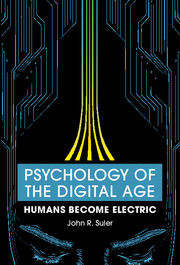Book contents
- Frontmatter
- Dedication
- Contents
- List of Figures
- Foreword
- Preface
- Acknowledgments
- Introduction: Newborns in Evolution
- 1 Cyberpsychology Architecture
- 2 Presence: Be Here Now
- 3 The Dynamic Digital Psyche
- 4 The Disinhibited Self
- 5 Electrified Relationships
- 6 Other Than You Think: Interpersonal Perceptions
- 7 Text Talk
- 8 Image Talk
- 9 I, Avatar
- 10 One of Us: Groups and Communities
- 11 Change and Excess
- 12 Addicted or Devoted
- 13 The Digital Deviant
- 14 Synthesized Realities and Synthesized Beings
- 15 Electric Th erapeutics
- Conclusion: Research and the Researcher
- References
- Index
Foreword
Published online by Cambridge University Press: 05 November 2015
- Frontmatter
- Dedication
- Contents
- List of Figures
- Foreword
- Preface
- Acknowledgments
- Introduction: Newborns in Evolution
- 1 Cyberpsychology Architecture
- 2 Presence: Be Here Now
- 3 The Dynamic Digital Psyche
- 4 The Disinhibited Self
- 5 Electrified Relationships
- 6 Other Than You Think: Interpersonal Perceptions
- 7 Text Talk
- 8 Image Talk
- 9 I, Avatar
- 10 One of Us: Groups and Communities
- 11 Change and Excess
- 12 Addicted or Devoted
- 13 The Digital Deviant
- 14 Synthesized Realities and Synthesized Beings
- 15 Electric Th erapeutics
- Conclusion: Research and the Researcher
- References
- Index
Summary
Professor John R. Suler is acknowledged as the world's leading expert in cyberpsychology and the founder of the discipline. As a cyberpsychologist, I am honored to be invited to introduce readers to this text.
Psychology of the Digital Age: Humans Become Electric presents an engaging overview of the field of cyberpsychology as a unique discipline, and will appeal to anyone who is immersed in or fascinated by the experience of online environments. The book you are about to enjoy is a wide-ranging exploration of the profound impact of technology on human beings, and the significance of cyberspace as a new environment humans have created for ourselves.
Cyberpsychology has been considered by some to be a subdiscipline within applied psychology; however, Professor Suler's treatment creates a powerful argument for the consideration of cyberpsychology as a unique and valuable discipline in its own right, and is groundbreaking in this regard. Suler draws on a vast range of theoretical constructs in psychology, including psychodynamic theory, operant theory, group dynamics theory, and theories of human motivation, which not only ground the cyberpsychological arguments in established science, but also showcase his vast knowledge of the psychology of human behavior mediated by technology.
Many current debates and trends concerning the impact of technology on human behavior are explored. I found the section that discusses the psychoanalytic typology of Nancy McWilliams particularly insightful. Professor Suler points out that this typology has explanatory value regarding the full spectrum of human personality, from normal to pathological. This premise is then wonderfully illuminated in an applied context, whereby personality is considered in online environments – for example, psychopathic personality types and the impact of online anonymity, or narcissistic personalities and the forums they select to display themselves.
In an important chapter on the disinhibited self, Professor Suler explores the online disinhibition effect. This effect, one of the principal and best-known constructs in the discipline of cyberpsychology, was conceptualized and first proposed by the author over a decade ago. His publications on this phenomenon have been cited thousands of times. As an active researcher in this field, I am perhaps most excited about the new theoretical model that Professor Suler has created.
- Type
- Chapter
- Information
- Psychology of the Digital AgeHumans Become Electric, pp. ix - xPublisher: Cambridge University PressPrint publication year: 2015



